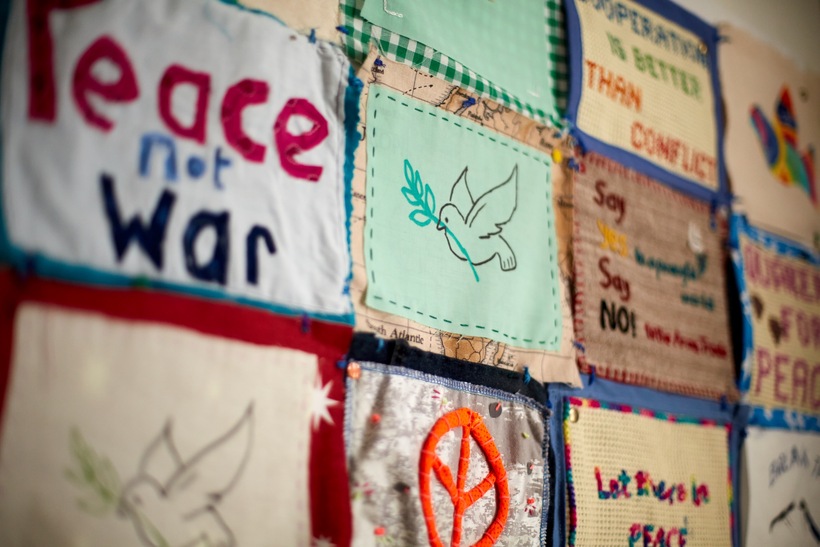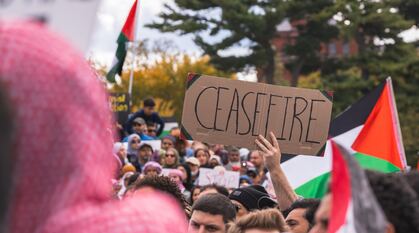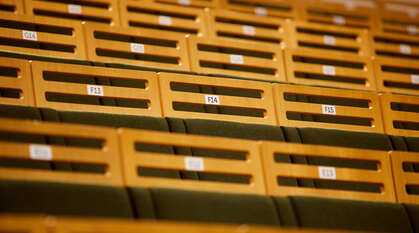Why I am still a pacifist
How do we stay true to our peace testimony in times of war? Many Quakers struggle with this difficult question. Tim Gee reflects on the spiritual and practical considerations involved.

I became General Secretary of the Friends World Committee for Consultation in January of 2022, a role of service to the world's 400,000 or so Quakers, who collectively comprise one of the world's traditional peace churches.
In February of 2022 the full scale invasion of Ukraine by Russia began. Almost immediately a process of testing, working out, challenge and grappling began as Friends explored individually and together, how or whether pacifism can remain a tenable position in such a context.
I describe myself as a pacifist, and even wrote a book about it a few years ago. I did not expect this to be tested so early in the course of my new role.
There is of course a difference between pacifism and Quaker peace testimony. Pacifism is a relatively new word, only a century or so old. Quakers have been around a lot longer than that. Most Quakers who have ever lived then, have not been 'pacifists' as such.
But there is also a relationship: today 'Quaker pacifism' is often used as a shorthand to refer to our peace testimony. Shorthands are fine, as long as we all know that's what they are.
Peace testimony
Our peace testimony isn't a document, or a statement, or a creed, or an ideology. Testimony means 'witness'. Our peace testimony is the cumulative body of action and reflection flowing out of Friends' experience of the divine, as we've sought to interpret it in different situations.
Many people might well be surprised to discover Wolf Mendl's observation, reproduced in chapter 24 of Britain Yearly Meeting's Quaker faith & practice, saying that there are no formal rules laid down for Quaker conduct in times of war, except to follow the Light of Christ.
The Light of Christ in practice seems to have led us to work for peace, ever since the time of those early Friends who declared "we utterly deny all outward wars and strife and fightings with outward weapons, for any end, or under any pretence whatsoever; and this is our testimony to the whole world."
In every major time of war Friends have tried to articulate Quaker peace testimony in that context (many of them are also in Quaker faith & practice). In 2022 I was part of a group that tried to do that in the context of the war in Ukraine, and in 2023 we did the same about Israel and Palestine.
In the first of them we referenced Sydney Bailey's 1993 Swarthmore Lecture, which recognises some common themes, running through Quaker peace testimony, summarised as (1) the refusal to kill, (2) relief of suffering and (3) responding to the call to be peacemakers by building the institutions of peace and removing the causes of war.
In essence though it is about the vocation God has given to us to be peacemakers who (to borrow some words from Margaret Fell) profoundly seek that "others' feet may walk in the same".
The first step then is spiritual – following the leadings of the living Christ and the Biblical Jesus (and James, and Paul and the Prophets for that matter). An early Quaker text described Friends as being led by two lights – the Light of Christ and the light of reason, the second of which follows the first, like the moon reflects the sun.
Although it is not the first step then, we can and should apply rational thought, as part of a process of discernment. And rationally, through experience and reason we can say that the only route to long term peace is to do long term work for peace. War, in practice, tends to lead to more war.
The war in Ukraine
This piece began by looking back to February 2022, when the full scale invasion of Ukraine began. There was a moment then – almost a couple of months – when media were focussing on the human costs of invasion and war (quite a contrast to the pattern of war reporting in the last 20 years).
Politicians, faith leaders and people powered protests alike were calling for peace. Even large companies who would usually claim they are just trying to make money for their shareholders started calling for peace and backing it up by moving their operations.
There were also peace talks at that time. The details are disputed and no doubt more will emerge about what could have been, and the lives that could have been saved had they been able to reach an agreement. With hindsight people will ask whether the eventual outcome, whatever it is, was better or worse than what could have been agreed then.
One detail that has come out appears to be that one of the factors that weakened that possibility was the intervention of the UK's then Prime Minister. I say this to underline the point that, even thousands of miles away, the words and actions of the people that speak in our names still have an impact internationally.
But then the decision was made to fight on, and the reporting changed accordingly. A good many people who opposed the various aggressive wars and invasions of the past two decades, supported arming Ukraine in this circumstance, on the basis of self-defence.
That left Quakers in an unusual and uncomfortable situation, without the same kind of experience and expertise that our agencies have for example in Israel and Palestine, without the kind of relationships or name recognition that would allow us to serve a mediation role, and in a polarised political and media environment where whatever messages we could get out about peace were likely to be misunderstood or misinterpreted. Plus we became all the more exposed in the absence of the kind of broad-based anti-war movement of the type there was against the wars in Iraq and Afghanistan.
So there was a lot of questioning. There's also a thought experiment I imagine many of us will have done, asking "what would I do if I was Ukrainian, or lived in another country that borders with Russia?" And it's an important question, indeed a necessary one. Understanding or indeed empathising with the reasons people have to fight, is a very good step towards being able to be a peacemaker.
It's also impossible to answer. None of us can know what God would call us to do if we were someone else. We can only ask what God is calling us to do or be as who we are, where we are now.
What we can also do is ask what Friends who are closer to the frontline are doing. When I visited Quakers in bordering countries last year I didn't find the same kind of intellectual anguish as in Britain and the USA. Instead I found people immediately and practically moved to help people fleeing from Ukraine in whatever kinds of ways they could.
[QUOTE-START]
Whatever happens the world is going to need people who know about peace
[QUOTE-END]
So love is the first motion. But we can apply logic to these situations. We can look at what the possible futures for this conflict are. At the time of writing, the one that looks most likely is a long and bloody continuation of the war leading to much more death and suffering. A second is some kind of negotiations especially as costs mount, leading to a truce that could turn into an uneasy peace. A third is outright victory for Ukraine, possibly with a highly militarised border in the east. A fourth is outright victory for Russia, probably with a highly militarised border in the west.
There is something all of these have in common: whatever happens the world is going to need people who know about peace; keeping it, nurturing it, extending it and so on. It is also going to need to support an international system invested in peace with the tools to grow it. That is something that we know something about, and something we can and do contribute to through our words, actions and international programmes. It's also something which people recognise and trust us for, thanks to our peace testimony.
Another thought experiment we could engage in would be to ask, what if, after hundreds of years of peace work, Friends decided, actually perhaps war in some circumstances is ok. Would the world be any more peaceful if the small number that Quakers represent tried turning our hands to war instead? I don't think it would. I also don't think we would be very good at it.
The world already has many war makers, and a few more would hardly be noticed. If the world is going to make peace though, then the world needs people committed through their hearts, their minds, their prayers and their actions to peace. There are already precious few. We can all be part of nurturing more.
The war in Palestine
This year I was signatory to another statement, led by Quaker agencies and released on 17 October 2023, affirming our belief in the sacred worth of each person, mourning every killing in Israel and Palestine, and calling for a ceasefire and the return of all hostages.
At that time the most reliable available reports said that the Hamas attack on Israel on 7 October had killed over 1,300 Israelis. As of 16 October, the subsequent Israeli military attack on Gaza had killed at least 2,950 Palestinians, including over 1,030 children. It had displaced more than one million Palestinians in Gaza, with over 7,500 homes destroyed. We warned that these numbers will continue to rise if attacks do not end.
Even a few weeks later I find it very difficult to read those words, knowing that those numbers did rise, five-fold at the time of writing and probably even further by the time this is read. In the midst of this there was a fragile truce. Incomplete as it was, for a few days our screens were filled with images of relieved families reunited with their loved ones, and for an all too brief moment saw the fruits of what dialogue can do.
[QUOTE-START]
None of the ways forward are easy, or simple or pure
[QUOTE-END]
What does this mean for our peace testimony? This time I have not heard the same wrangling as before. In a situation where each side believes they are acting in self-defence, and uses this as their justification for extreme violence, the call for a ceasefire and release of hostages provides another way, which a great many institutions and groups are calling for. The pause in fighting was widely mourned as having been too short.
There are also things we can say and do based on longstanding experience. The Friends School in Ramallah has long provided a good quality, peace oriented education for its students, and has been receiving attention and support from Friends more widely. Quakers in Britain has long been supporting ecumenical human rights observers in the West Bank and American Friends Service Committee (AFSC) has staff in Gaza, who against the odds have been managing to get some emergency help to people there.
This though provides a different challenge. Here is a situation where Friends have been doing long term work for peace. There have been Quakers in Palestine doing educational, humanitarian and peace work for 150 years. In 1948 some of the refugees sheltered at the Friends Meeting House. AFSC helped set up some of the refugee camps in Gaza which are now being bombed. Yet, despite this long term work, there is no long term peace.
Significant as all this work is though, for all the effort that goes in, and for all of the good that comes of it, the Quaker and broader peace presence in Palestine and Israel is still relatively small, and sometimes marginalised. The war is not a result of too many peacemakers in the Middle East.
If this presents problems for peacemakers, it does for supporters of war too. Some of those people, particularly on parts of the political left, who supported the right of Ukrainians to resist occupation with arms, sought to stay consistent to that principle, and insist on the right of Palestinians to do so too. When some of the gruesome images came through of the human impacts of attempting to apply that principle in practice, many of those people had to row back from their previous view.
Then there are others who support the right of Ukrainians to resist occupation with arms, but don't apply the same to Palestinians. And it's reasonable to ask why this is, including whether racism, or religious bias might be part of it. Of course the situations and the armies are different, but if someone was to suggest that one army was entirely moral and the other not, it's fair to point out that that there are well documented extreme and unsavoury elements in Ukraine's army too, some of whom will likely be beneficiaries of the arms that are sent.
I only say this to point out that while its right Friends and other peacemakers grapple with peace principles in the context or armed conflict, turning to war isn't an easy answer either. None of the ways forward are easy, or simple or pure.
Conclusion
Although I've already said it, I'd like to say it again. The world isn't suffering from too many peacemakers. When people say "but if pacifists were in charge then x, y, z" I say pacifist aren't in charge, have never been in charge, largely only even get a say in the media if they are there to be ostracised, and are not the people who have caused the wars currently tearing the world apart.
Who could disagree though with the idea that the world needs more peacemakers, and that if governments invested as much in peace as they do in war, the world would be a more peaceful place?
I'd like to finish more personally though. What is it that I can say? The starting point for a lot of what I've decided to do with my life is that I don't think killing thousands of people can ever be the right thing to do.
I became part of the peace movement following the attack on the twin towers on September 11 in 2001. To watch 3000 people be killed, practically live on TV was a shocking moment for probably everyone who saw it. That killing was so obviously, so gutturally, so inarguably wrong.
If killing 3000 people was wrong in New York, I thought, it was wrong in Afghanistan too, and wrong when maybe 300,000 people were killed in Iraq. That was a lonely thing to say and believe at first, but with time it has become a more mainstream view.
[QUOTE-START]
Someone has to say – and keep saying – that it is never ok to kill thousands of people for any end
[QUOTE-END]
I used to think politicians had simply been taken in by the untruths that were spoken to justify that war. Afterwards many of those people who voted for it said that if they knew then what they knew now then they wouldn't have supported it.
Since the war in Iraq though we've had the austerity measures, which some studies suggest led to 300,000 early deaths in Britain alone. Then we've had the pandemic through which we are learning the ways that the government did not take seriously the threat and the huge human cost of that.
Then the news that the UK government may have had a role in prolonging the war in Ukraine, and has been painfully slow to call for a ceasefire in Israel and Palestine.
And I've had to conclude that the problem is not that powerful politicians and decision makers have imperfect information. But instead that, whatever their rhetoric, they, and enough of the people who put them there, are actually quite ok with the idea of thousands of people dying in some circumstances.
And I think someone has to say, and keep saying and to teach and to preach that it is never ok to kill thousands of people for any end, or under any pretence whatsoever, and that this is our testimony to the whole world.
We pray that other's feet may walk in the same.
This article by Tim Gee is based on a contribution to a Woodbrooke session exploring how Quakers maintain their testimony to peace during times of war. Woodbrooke is a Quaker research and learning organisation based in Britain. Find out more about their courses. Tim Gee's book, Why I am a pacifist, is available from the Quaker Bookshop.
Quaker reflections on the testimony to peace in light of the invasion of Ukraine


